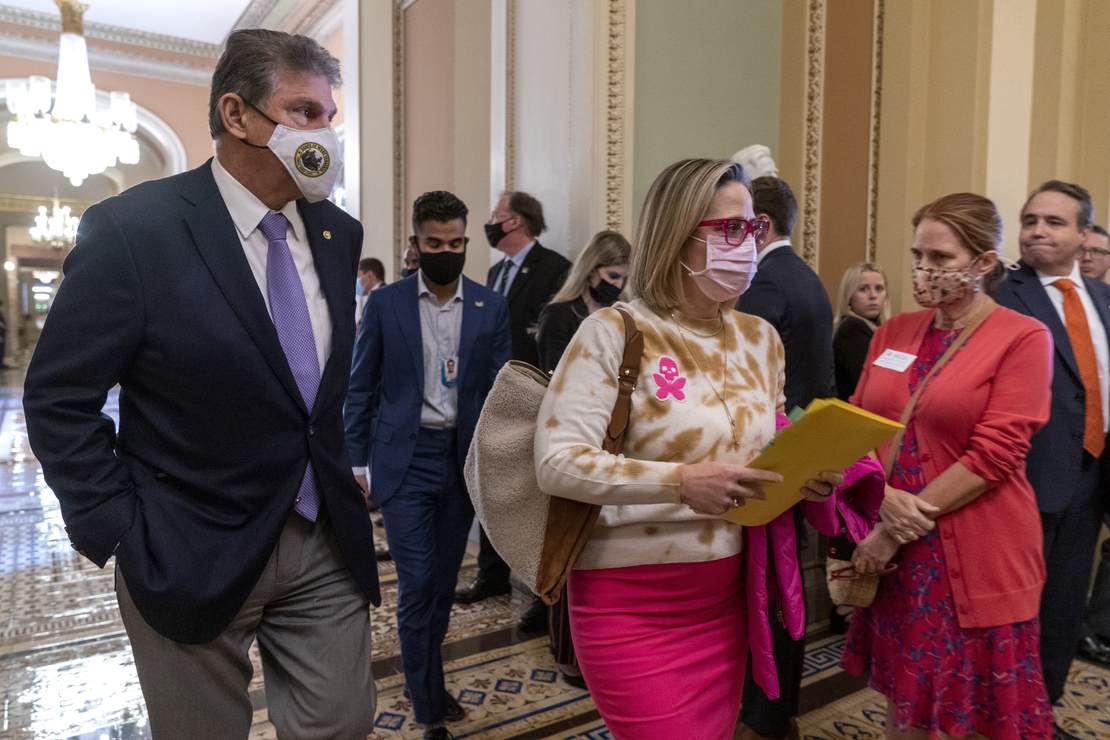
“Bluff” is the wrong word. She hasn’t said she won’t support the bill, after all.
She hasn’t said much of anything. That’s their problem. She’s Sphinx-like! If they wait for her to show her cards on the Schumer/Manchin deal, they might be waiting weeks. They don’t have weeks.
So they’re going to put the bill on the floor and all but dare her to vote no. “Schumer made a calculated decision to negotiate a package with Manchin in secrecy,” Axios noted a few days ago. “He assumed that all of his other members, including Sinema, would fall into line and support the deal.”
That assumption will now be tested in real time, in front of the entire country.
Schumer and Manchin are gambling that Sinema lacks the nerve to torpedo a deal that progressives are treating as almost miraculous, an eleventh-hour surprise as their majority in the House ticks away that will deliver many billions of dollars of spending to reduce climate change. She’s already looking at a serious primary challenge from the left in 2024; if she blows up a major bill that even Joe Manchin supported, she’s toast. She’d have a better chance of holding her seat as a Republican in the next cycle than as a Democrat.
I mean, c’mon:
NEW Poll w/@YahooNews: Americans favor Manchin-Schumer climate deal by wide margins.
Net approval for:
Climate/energy package: +17
Prescription drug prices: +47
Business taxes: +34https://t.co/N9u4ZHqAIl pic.twitter.com/mZq3CLRpSJ— YouGov America (@YouGovAmerica) August 2, 2022
Are they right that she’ll cave and vote yes despite being cut out of negotiations which she’d spent the past year being included in? Literally no one knows, including Manchin and Schumer.
Senate Democrats will probably start a climactic series of votes on their party-line energy, tax and health care bill this week with very little public indication of where Sen. Kyrsten Sinema stands. They’re willing to risk it.
At the center of the Sinematic intrigue is Manchin’s push to narrow a loophole known as carried interest that some investors use to lower their tax rates, a shrinking that she opposes. Manchin said he planned to talk to Sinema on Tuesday afternoon, telling West Virginia radio host Hoppy Kercheval that “this is everything Kyrsten agreed to in December … she’s the one who kept saying, no new taxes.”
Still, the carried interest tax provision was not in December’s more expensive version of the Democrats-only bill that Sinema had generally signed off on. And its inclusion is a main factor in Sinema’s public neutrality about a bill 49 of her colleagues are expected to support.
Manchin did in fact talk to Sinema this afternoon. Right out in the open, in full view of CSPAN’s cameras.
READ RELATED: Single NYPD subway patrol plan panned by police
Here’s Sen. Manchin talking with Sen. Sinema as she presides in the Senate.
They started talking at 2:50pm. pic.twitter.com/Qs8tExTPCr
— Jeremy Art (@cspanJeremy) August 2, 2022
The Schumer/Manchin closes the so-called carried-interest loophole favored by real-estate investors, generating $14 billion in new revenue. But Sinema had been adamant in previous negotiations about leaving that loophole alone, and her colleagues knew it. The fact that they insisted on sticking it into the new deal despite the meager impact it will have on reducing the deficit has led to theories that they quietly intended all along to strip it out as an eventual “concession” to Sinema, to make her feel like gained something important when she inevitably asks them to take it out and they agree.
Maybe that’ll earn her vote. See how reasonable they’re being, bowing to her demands?
I wonder how she’ll feel about being patronized that way.
There’s another way she can complicate life for her caucus short of voting to tank the bill. Part of the reconciliation process involves a “vote-a-rama” in which the two parties introduce and vote rapid-fire on a series of amendments. A long series of amendments. To the point where it can take a marathon all-night session of the Senate to get through them all. Vote-a-rama is useful for the minority party since it gives them the power to introduce poison pills in hopes of tanking the main bill — like, say, an amendment to strip out the carried-interest loophole. If Sinema joins them on that and the amendment passes 51/49, where does that leave Manchin on the newly amended bill? Does he walk away if the loophole remains intact and tank the whole bill?
Sometimes the majority copes with problematic poison-pill amendments by introducing a “wraparound” amendment at the end of the vote-a-rama session that essentially restores the bill to its original form, before it was amended. But it’s not clear that Sinema would agree to that after she’s voted to restore the carried-interest loophole. Reporters have been after her lately asking how she’d feel about a wraparound. Response: Stony silence.
In fact, per Axios, “Sinema has given no assurances to colleagues that she’ll vote along party lines in the so-called ‘vote-a-rama’ for the $740 billion bill next week, according to people familiar with the matter.” On major legislation, the parties tend to hang together and vote party-line simply to avoid upsetting the delicate balance of the negotiations that led to the final bill. But Sinema wasn’t involved in that. How much party loyalty will she feel under the circumstances to make life easier procedurally for Schumer and Manchin?
She’s biding her time for now, until the Senate parliamentarian rules on what can and can’t properly be included in the bill. The reconciliation process is limited to budgetary provisions only, after all, and it’s up to the parliamentarian to decide what’s budgetary. Maybe she’ll end up doing some of the political heavy lifting for Sinema by narrowing the bill on procedural grounds.
I’ll leave you with Manchin getting a little punchy earlier today in an interview with Fox host Harris Faulkner. Exit question: Will his bill really reduce inflation if it ends up killing thousands of American jobs? “By reducing long-run economic growth, this bill may actually worsen inflation by constraining the productive capacity of the economy.”
Joe Manchin: “Are you scared that we’re going to do something good that will help our country?”
Harris Faulkner: “Of course not! My father served! Are you kidding?! Service is in the Bible! That’s what we do, we serve our fellow man and woman! … Don’t make this personal!” pic.twitter.com/SLcgnE63NQ
— Justin Baragona (@justinbaragona) August 2, 2022
Source:






